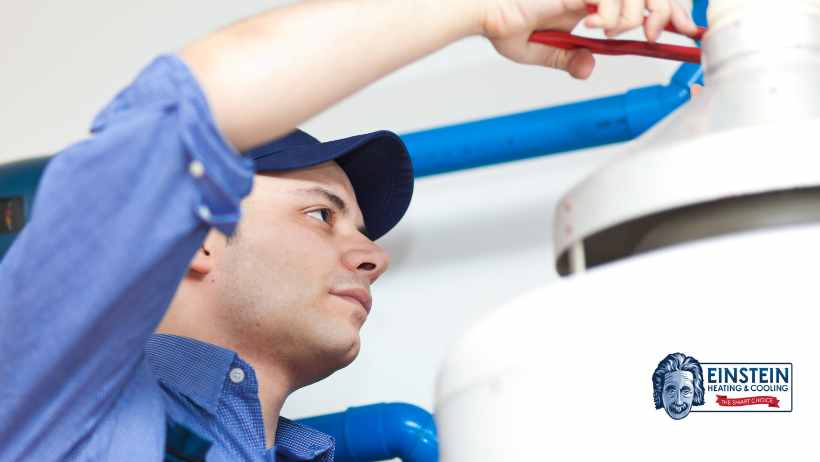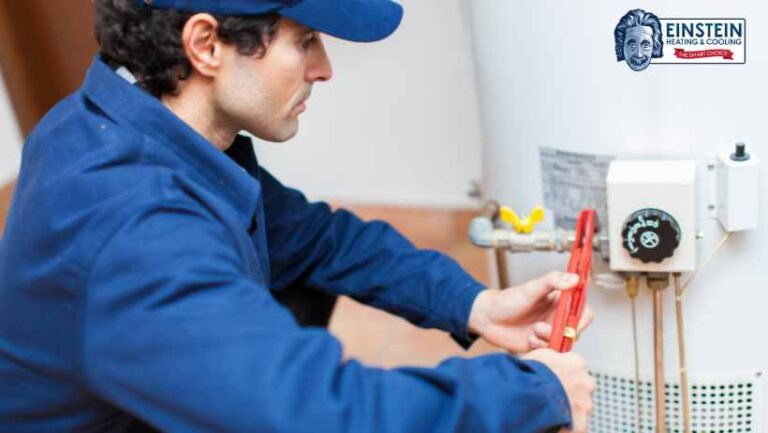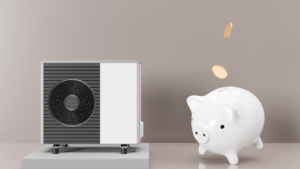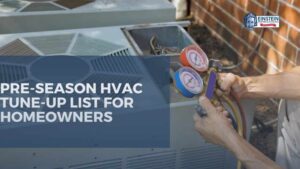If you’re on the lookout for reliable hot water heater solutions during the chilly Redmond winters, there are many factors you need to consider. Hot water heaters provide you with warm water for showers, dishwashing, and laundry while also helping maintain a cozy indoor temperature. In this blog post, we’ll explore 12 key factors in choosing the best hot water heater solutions and answer 10 commonly asked questions about water heaters.
Frequently Asked Questions About Hot Water Heaters and Their Answers
1. How Does a Hot Water Heater Work?
- A hot water heater operates by heating and storing water for various domestic uses such as bathing, washing dishes, and laundry. Most hot water heaters, particularly tank-type models, function through a simple yet effective process. Cold water enters the tank through a dip tube, where it is then heated by an electric heating element or a gas burner located at the bottom of the tank. As the water heats, it naturally rises to the top of the tank, ready to be dispensed when a hot water tap is turned on. This way, you have a continuous supply of hot water.
2. What Is the Lifespan of a Hot Water Heater?
- The typical lifespan of a hot water heater is approximately 10 to 15 years. However, this duration can vary depending on several factors, such as the water quality in your area, the frequency of maintenance, and the specific model. To maximize the lifespan of your hot water heater, it’s essential to perform regular maintenance, such as flushing the tank and checking for leaks. Additionally, installing a sacrificial anode rod can help prevent corrosion and extend the unit’s life.
3. Why Is My Hot Water Heater Making Strange Noises?
- Unusual noises emanating from your hot water heater can be unsettling, but they often indicate sediment buildup within the tank. As water heats, minerals in the water can settle at the bottom of the tank, creating a layer of sediment. When the heating element or burner operates, it heats this sediment, causing popping or rumbling sounds. To resolve this issue and prevent damage to your hot water heater, periodic tank flushing is necessary. This involves draining the tank to remove the sediment buildup, ensuring the heater operates quietly and efficiently.
4. What Should I Do If My Hot Water Heater Leaks?
- A leaking hot water heater is a cause for concern, as it can lead to water damage, mold growth, and energy inefficiency. In the event of a leak, it’s vital to take immediate action. First, turn off the power supply (for electric heaters) or the gas supply (for gas heaters) to ensure safety. Next, shut off the water supply to the heater. Contact a professional plumber or hot water heater technician to assess the source of the leak and recommend necessary repairs or a replacement. Quick action can prevent further damage and ensure the safety of your home.
5. How Can I Increase the Efficiency of My Hot Water Heater?
- Improving the efficiency of your hot water heater can help lower energy costs and prolong its lifespan. Here are some hot water heater solutions to increase efficiency::
- Insulation: Adding an insulation blanket to the tank can help reduce heat loss, especially if your tank is located in a cold area like a garage.
- Temperature Setting: Adjust the thermostat to around 120°F (49°C) to prevent overheating and save energy. This temperature is generally sufficient for most household needs.
- Regular Flushing: Periodically flush the tank to remove sediment, as this can impede the heater’s efficiency.
By implementing these measures, you can enjoy a more energy-efficient hot water heater, saving both money and resources.
6. What Size Hot Water Heater Do I Need?
- Determining the appropriate size of a hot water heater depends on the number of people in your household and your specific hot water usage patterns. A smaller tank may suffice for a single or two-person household, while larger families may require a more substantial tank or even a tankless hot water heater. Consult a professional technician from Einstein Heating and Cooling who can perform a proper assessment of your needs and recommend the right size to ensure a constant supply of hot water without excessive energy consumption.
7. Is It Better to Choose a Tankless Hot Water Heater?
- Tankless hot water heaters offer several advantages, making them a great choice for specific situations. Their primary benefit is energy efficiency since they only heat water when it’s needed, reducing standby energy losses. Tankless units are also compact and can be installed closer to the point of use, which reduces water and energy waste associated with long pipes.
However, whether a tankless hot water heater is better for you depends on your household’s hot water demands and your budget. Tankless heaters are ideal for smaller households and applications where space is limited. Still, it’s crucial to consult with a professional to determine if a tankless system is the right fit for your needs.
8. How Do I Prevent Hot Water Heater Freezing in Winter?
- To prevent your hot water heater from freezing during the winter months, especially if it’s located in an unheated space like a basement or garage, consider these strategies:
- Insulation: Insulate the hot water pipes and, if necessary, the tank itself using appropriate insulation materials. This helps retain heat and prevent freezing.
- Thermostatic Valve: Install a thermostatic mixing valve, which blends hot and cold water to maintain a consistent temperature, thus reducing the risk of freezing.
- Draining: In extremely cold climates, you can drain the tank when it’s not in use during winter vacations. This avoids the possibility of freezing, but it may be less practical for daily use.
- Electric Heat Tape: If your tank is prone to freezing, you can use electric heat tape on the pipes to keep them warm and prevent freezing.
9. Why Is My Hot Water Not Getting Hot Enough?
- If your hot water doesn’t reach the desired temperature, several factors may be contributing to this issue:
- Thermostat Setting: Check the thermostat on your hot water heater and ensure it is set to an appropriate temperature, typically around 120°F (49°C).
- Faulty Thermostat: A malfunctioning thermostat may not accurately regulate the temperature. In this case, the thermostat may need adjustment or replacement.
- Heating Element Issues: Electric hot water heaters have heating elements that can burn out or become defective over time. Replacing a faulty heating element may be necessary.
- Sediment Buildup: Sediment in the tank can insulate the water from the heating element, reducing efficiency. Regular flushing can help eliminate this issue.
10. How Can I Extend the Life of My Hot Water Heater?
- Extending the life of your hot water heater is achievable with proper care and maintenance. Here are some essential steps to prolong its lifespan:
- Regular Flushing: Periodically flush the tank to remove sediment, which can lead to corrosion and reduce efficiency.
- Inspect the Anode Rod: The sacrificial anode rod helps prevent tank corrosion. Check it annually and replace it if it’s significantly corroded.
- Check for Leaks: Routinely inspect for leaks around the tank or connections. Address any leaks promptly to prevent further damage.
- Professional Water Heater Maintenance: Consider scheduling an annual maintenance check with a professional to ensure the system is in good working order.
By following these steps, you can keep your hot water heater in excellent condition and maximize its lifespan.

Factors to Consider for Hot Water Heater Solutions in Redmond
1. Fuel Type
The choice of fuel type for your hot water heater plays a pivotal role in its efficiency, operating costs, and environmental impact. Redmond offers a range of options, each with its own set of advantages and disadvantages:
- Electric Heaters: Electric hot water heaters are known for their reliability and ease of installation. They are highly efficient at converting energy into heat. However, their operational cost tends to be higher, especially in areas with expensive electricity rates.
- Natural Gas Heaters: Natural gas heaters are cost-effective and deliver a consistent supply of hot water. They are widely used in Redmond and are often chosen for their affordability. However, installing a natural gas line may be necessary if your home does not have one.
- Propane Heaters: Propane heaters are a versatile choice, suitable for areas without access to natural gas lines. They offer efficient water heating and are a popular option in rural areas. However, propane can be more expensive than natural gas, so operational costs may vary.
- Solar Heaters: Solar hot water heaters are the eco-friendly choice, utilizing solar energy to heat water. While they have higher upfront costs, they are incredibly energy-efficient and can significantly reduce your carbon footprint. In Redmond’s sunny climate, solar heaters are a viable and sustainable option.
2. Size and Capacity
Selecting the right size and capacity is an important method for choosing the best hot water heater to meet your household’s hot water demands. Consider the following aspects:
- Household Size: The number of people in your home plays a crucial role in determining your hot water needs. Larger households require larger hot water heaters to ensure an adequate supply for everyone.
- Water Usage Habits: Take into account the water usage habits in your household. Do you have family members who take long showers or use hot water for multiple purposes simultaneously? These factors influence the size you need.
- Number of Fixtures and Appliances: Consider the number of fixtures and appliances that require hot water, such as showers, sinks, dishwashers, and washing machines. Calculate the total hot water demand to determine the required capacity.
3. Energy Efficiency
Energy efficiency is a vital factor when choosing a hot water heater. A more energy-efficient unit not only reduces your utility bills but also lowers your environmental impact. Look for the following elements:
- Energy Factor (EF) Rating: Check the Energy Factor (EF) rating of the hot water heater. Higher EF ratings indicate greater efficiency. Tankless water heaters, for example, are renowned for their energy efficiency since they only heat water when needed.
- Energy-Saving Features: Investigate the specific features that contribute to energy savings. These may include advanced insulation, heat recovery systems, and programmable timers that allow you to control when the heater operates.
4. Cost
Cost considerations are paramount when choosing a hot water heater. Your budget should encompass the initial purchase price, installation expenses, and ongoing operating costs:
- Initial Cost: Different types of hot water heaters come with varying initial costs. Electric heaters are often the most affordable, while solar heaters tend to be more expensive due to their technology. Consider your budget when making a selection.
- Installation Expenses: The installation process and associated costs can vary based on the type of heater. Complex installations, such as setting up a solar water heater, might require additional expenses.
- Operating Costs: Be aware of the long-term operating costs, including energy bills and maintenance. Natural gas and propane heaters are typically more cost-effective to operate compared to electric heaters.
5. Installation and Location
The proper installation and location of your hot water heater are essential for its safety, efficiency, and longevity. Here are some key considerations:
- Professional Installation: Hiring a professional for the installation is highly recommended. They can ensure that the heater is installed correctly, minimizing the risk of issues and safety hazards.
- Location: Choose an appropriate location for the heater, preferably close to the areas where hot water is needed. Additionally, follow local building codes and regulations when determining the location.
- Ventilation: Ensure that the heater is adequately ventilated to disperse any combustion byproducts and prevent a buildup of potentially harmful gas.
6. Type of Heater
There are various types of hot water heaters to choose from, each with its unique set of features and advantages:
- Storage Tank Water Heaters: These are the most common type and store a reserve of hot water. They come in various sizes, with larger tanks suitable for households with higher hot water demands. The constant heating of the stored water can lead to energy loss, but modern tanks are well-insulated to mitigate this.
- Tankless Water Heaters: Tankless water heaters, also known as on-demand heaters, heat water only when you need it. This results in substantial energy savings, as there is no standby heat loss. They are compact and ideal for smaller spaces.
- Heat Pump Water Heaters: These innovative heaters use electricity to move heat from the air or ground to heat water. They are highly efficient and are a great choice for reducing energy consumption and costs.
- Solar Water Heaters: Solar water heaters harness the power of the sun to heat water, making them one of the most environmentally friendly options. While they have a higher upfront cost, they pay for themselves over time through energy savings.
7. Brand and Model
Selecting a reputable brand and model is crucial to ensure reliability and performance. Consider the following aspects when making your choice:
- Reputation: Research and read reviews to identify brands and models with a history of quality and durability. Consult with professionals in the field for recommendations.
- Customer Support: Look for brands known for their excellent customer support and service. This is crucial in case you encounter any issues with your hot water heater.
- Warranty: Review the warranty provided by the manufacturer. A longer and more comprehensive warranty can provide peace of mind and financial protection in case of unexpected malfunctions or breakdowns.
8. Maintenance
Regular maintenance is essential for extending the lifespan of your hot water heater and ensuring its optimal performance:
- Routine Checks: Regularly inspect your hot water heater for signs of wear and tear, corrosion, or leakage. Address any issues promptly to prevent more significant problems.
- Flushing the Tank: For storage tank water heaters, flushing the tank annually can help remove sediment buildup, which can improve efficiency and extend the tank’s lifespan.
- Professional Servicing: Consider scheduling annual professional maintenance to ensure that all components are in good working condition. This can help identify and address potential issues before they become major problems.
9. Warranty
A robust warranty is a crucial safeguard against unexpected expenses in the event of a malfunction or breakdown:
- Duration: Compare the duration of warranties among different models. Longer warranties provide more extended protection and can indicate the manufacturer’s confidence in their product’s durability.
- Coverage: Examine the details of the warranty coverage, including parts and labor. Some warranties may cover certain components for a more extended period.
- Registration Requirements: Ensure that you understand any registration requirements and follow them to activate and maintain your warranty.
10. Local Climate
Consider the local climate in Redmond when selecting a hot water heater. Different climates can influence the performance and efficiency of your chosen heater:
- Cold Climates: In colder regions, hot water heaters may need to work harder to maintain the desired temperature, especially during the winter months. A more powerful heater may be necessary to meet increased heating demands.
- Mild Climates: In milder climates, you may require a smaller and less powerful hot water heater. These climates are generally less taxing on the heater’s performance.
11. Local Regulations
Adherence to local regulations and building codes is vital when installing a hot water heater. Ensure that your selected heater complies with Redmond’s specific requirements:
- Permit Requirements: Check if permits are required for hot water heater installations. Your chosen installation professional should be aware of local permit regulations and can assist in obtaining them.
- Safety Regulations: Make sure the installation adheres to safety regulations, including proper ventilation and gas line connections.
- Environmental Compliance: If you’re environmentally conscious, ensure that your heater meets any local environmental standards and regulations.
12. Environmental Impact
In an era of increasing environmental awareness, it’s essential to consider the environmental impact of your hot water heater:
- Carbon Footprint: Evaluate the greenhouse gas emissions associated with your chosen fuel type. For example, electric heaters powered by renewable energy sources can significantly reduce your carbon footprint.
- Energy Efficiency: Opt for a heater with a high energy efficiency rating to minimize energy consumption and reduce environmental impact.
- Sustainability: If you’re committed to sustainability, consider solar or heat pump water heaters, which have a lower environmental footprint due to their reliance on renewable energy sources.
In Redmond, making the right choice for your hot water heater solutions involves a thoughtful consideration of these factors. It’s not just about having hot water; it’s about maximizing efficiency, minimizing costs, and contributing to a sustainable future
Why Choose Einstein Heating and Cooling
Einstein Heating and Cooling stands out as the top choice for clients seeking professionals in hot water heater installations, repair, and maintenance in Redmond, Oregon. We understand that a functioning hot water heater is essential for everyday comfort, and our skilled technicians are dedicated to swiftly resolving any issues or installing a new unit seamlessly. Furthermore, what truly sets Einstein Heating and Cooling apart is our unwavering commitment to customer satisfaction. You can trust us to provide accurate assessments, honest recommendations, and competitive pricing, ensuring peace of mind and affordability.
In Conclusion
Selecting the right hot water heater for your Redmond home is a crucial decision that can significantly impact your comfort, energy bills, and environmental footprint. The ideal hot water heater solutions should efficiently meet your hot water demands, align with your budget, and consider the long-term impact on your home and the environment. Contact us today to find the perfect solution for your home, one that keeps you warm, comfortable, and environmentally responsible.








